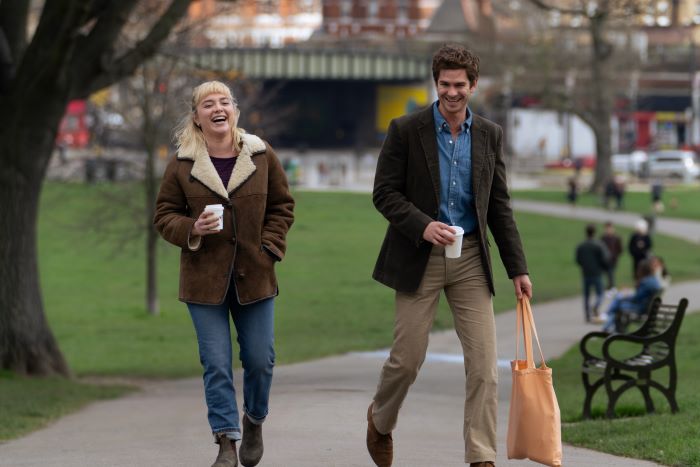A great love story, told and expressed sincerely, can withstand any amount of cynicism to find the audience it deserves. Irish director John Crowley knows a thing or two about romances, considering Brooklyn (2015) is probably one of the most beautiful love stories of the last decade. (He followed that with his somewhat bland, though visually sophisticated, adaptation of The Goldfinch in 2019.) Knowing that his new film We Live in Time brings him back to the genre he excels in sounds like the perfect gift for die-hard romantic cinephiles. This time, however, it wouldn’t be a period piece but a contemporary love story set in Britain, though with a similar purpose for intensity and surrender.
Let’s start with the meet-cute between Tobias (Andrew Garfield) and Almut (Florence Pugh), when he is at a low point, searching for pens in the middle of the night while wearing only a robe to sign his divorce papers, and she, in a rush, accidentally runs him over as he crosses a street. (Don’t worry, he needs just a neck brace and has a few bruises as a result.) Or maybe we should skip ahead to when the couple is in an idyllic state, with a child on the way, as Almut’s pronounced pregnant belly reveals. Or much later, when a doctor’s visit takes a bitter turn, delivering a cancer diagnosis.
You might think we’re jumping ahead with no respect for the notion of spoilers, but rest assured that all of this unfolds within the first 20 minutes. The title makes it clear: We Live in Time is a romance that uses the predictable nature of the genre (they meet, they fall in love, but will they make it to the end?) to toy with its structure, keeping us emotionally on edge. It’s a gimmick whose effectiveness is debatable, but it fits right in with the unique flavor you’d expect from an A24–distributed romance.
Once the classic components of the story are set—the central couple will consummate their love, start a family, and face a life-or-death matter (and you never know in which order)—the spectator’s task is to dive into the sweetness and charm of the lead performances and fall in love alongside them. Garfield and Pugh share instant chemistry, which is the wild card that determines the success or failure of romantic dramas. Garfield is sensitive, always on the verge of tears that never quite fall, while Pugh is a bit more determined, embracing each moment fully and saving her tears for later.
Though this isn’t a film with large conflicts, not in the sense of those that could tear the couple apart, there are two gut-punch arguments across different timelines. The first occurs before a confession of love from Tobias that lays bare all his fears and hopes. The second reveals Almut’s determination to live and love without denying her independence. She’s a chef, and her competitive nature drives her to enter a prestigious international contest despite the risks to her health: She doesn’t want her daughter to remember her only for her decline, but also for her achievements. There’s one fundamental difference that perhaps the film could have explored more: Almut seems to have a fuller life (work, friends, family) while Tobias mostly exists in regard to his love for her and later, their daughter. (Only his father appears in a couple of scenes and with little weight.) Of course, this is primarily a two-hander where the rest of the characters popping up are practically part of the scenery.
As a gift for the audience, Crowley’s new romantic incursion possesses a particular sense of humor that it is not afraid to take to the extreme. This is showcased in one of the best and most outrageous childbirth scenes ever conceived. (Hint: it takes place in a convenience store bathroom.) Sometimes, though, the film seems to contradict its own nature. On one hand, it tries too hard to be the Love Story (1970) for a new generation of moviegoers, while on the other, it seems afraid of becoming overly sentimental, constantly undermining every tear about to drop. “It’s okay not to be okay,” is a piece of advice given in one of the most dramatic moments. The film would’ve benefited from following that advice more closely.
Minor missteps aside, We Live in Time has enough distinctive elements in its formula to make it a potential hit with audiences (hopefully, since our current cinema landscape is starving for it). After all, it’s a movie-movie with capital Movie Stars at the peak of their beauty and shared charisma, which used to be common and is now celebrated as a rare event.

















Leave A Comment